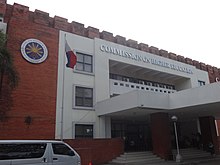
The University of the Philippines is a state university system in the Philippines. It is the country's national university, as mandated by Republic Act No. 9500, giving it institutional autonomy.

Ateneo de Manila University, commonly referred to as Ateneo de Manila or Ateneo, is a private, Catholic, teaching and research university, and a basic education institution located in Quezon City, Philippines. Established in 1859 by the Jesuits, it is among the oldest Jesuit-administered institutions of higher education in the Asia-Pacific.
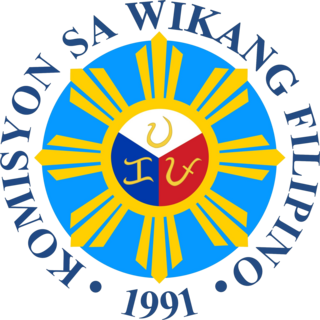
The Commission on the Filipino Language (CFL), also referred to as the Komisyon sa Wikang Filipino (KWF), is the official regulating body of the Filipino language and the official government institution tasked with developing, preserving, and promoting the various local Philippine languages. The commission was established in accordance with the 1987 Constitution of the Philippines.

Lyceum of the Philippines University, also referred to by its acronym LPU, is a private, non-sectarian, coeducational higher education institution located at Intramuros in the City of Manila, Philippines. It was founded in 1952 by José P. Laurel, who was the third president of the Republic of the Philippines.

Cebu Normal University, also referred to by its acronym CNU, is a state research university in Cebu City, Cebu, Philippines established in 1902.

West Visayas State University is a public normal research university located in La Paz, Iloilo City, Western Visayas region of the Philippines. It was established in 1924 as Iloilo Normal School under the tutelage of the Thomasites, but dates back its founding in 1902 as a part of Philippine normal school system with Iloilo National High School established by the American colonial government. It later became West Visayas State College in 1965 and acquired its university status becoming West Visayas State University in 1986.
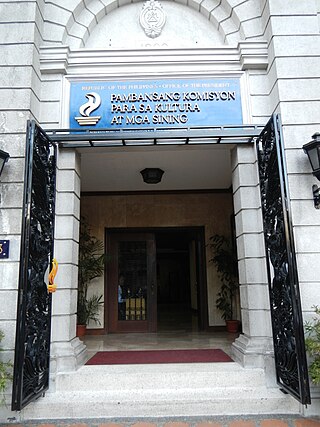
The National Commission for Culture and the Arts of the Philippines is the official government agency for culture in the Philippines. It is the overall policy making body, coordinating, and grants giving agency for the preservation, development and promotion of Philippine arts and culture; an executing agency for the policies it formulates; and task to administering the National Endowment Fund for Culture and the Arts (NEFCA) – fund exclusively for the implementation of culture and arts programs and projects.

The Technological University of the Philippines, commonly known as TUP, is a coeducational state university in the Philippines. It was established in 1901 by the Philippine Commission. TUP has its main campus in Manila and satellite campuses in Taguig, Cavite, Visayas, Batangas, and Quezon.
Education in the Philippines is compulsory at the basic education level, composed of kindergarten, elementary school, junior high school, and senior high school. The educational system is managed by three government agencies by level of education: the Department of Education (DepEd) for basic education; the Commission on Higher Education (CHED) for higher education; and the Technical Education and Skills Development Authority (TESDA) for technical and vocational education. Public education is funded by the national government.

Central Mindanao University is a research state university located in the heart of Mindanao Island, province of Bukidnon, Philippines. Founded in 1910, it is one of the oldest premier universities in the southern Philippines. CMU is recognized by the Commission on Higher Education (Philippines) as the Center of Excellence in the field of Agriculture, Forestry, Veterinary Medicine and Biology; and Center of Development in Mathematics, Environmental Science and Teacher Education. In 2017, CMU became the first higher education institution in Mindanao to be awarded with Institutional Accreditation by the Accrediting Agency of Chartered Colleges and Universities in the Philippines.

The Philippine Sports Commission is an agency of the Philippine government which tackles matters concerning sports in the country. The sports agency is independent from the Philippine Olympic Committee, a privately-ran organization which enjoys autonomy from the government.

The Securities and Exchange Commission is the agency of the Government of the Philippines charged with the registration and supervision of corporations and securities, as well as capital market institutions and participants, in the Philippines. As such, the Commission champions investor protection in the Philippines, as part of its mandate.

Bulacan State University is a public university in Bulacan province, Philippines. Its main campus is in Malolos.
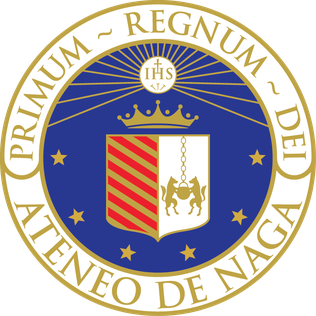
The Ateneo de Naga University, also referred to by its acronym AdNU, is a private Catholic Jesuit basic and higher education institution run by the Philippine Province of the Society of Jesus in Naga City, Camarines Sur, Philippines. It was established in 1940 when the Jesuits took over the administration of the diocesan school, Camarines Sur Catholic Academy. The Jesuits renamed the school Ateneo de Naga after taking control. The Jesuits were naming all the schools that they were opening at that time Ateneo. Ateneo de Naga was the fourth school named Ateneo by the Jesuits. Typical of universities in the Philippines, AdNU has primary and secondary departments, which are both coeducational.

The Commission on Audit is an independent constitutional commission established by the Constitution of the Philippines. It has the primary function to examine, audit and settle all accounts and expenditures of the funds and properties of the Philippine government.
Ponciano B. Peralta Pineda is a Filipino writer, teacher, linguist and lawyer. Ponciano Pineda is considered as the "Father of the Commission on Filipino Language" for his promotion to establish a commission based on Section 9 of our Philippine Constitution.
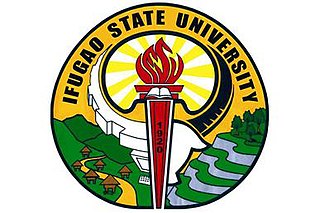
Ifugao State University (IFSU) is a government owned and funded university in the Philippines. It was originally established in 1920 as 'Nayon Settlement Farm School' by American educators. It gained its university status under Republic Act 9720 passed by the Philippine Congress and the Senate of the Philippines and duly approved in 2009 by Gloria Macapagal Arroyo, then President of the Republic. With the main campus in Lamut, Ifugao, it is mandated to offer course specializations on Agriculture, Forestry, Nursing, Social Sciences, Criminology, Teacher Education, Business Administration, Public Administration, Information Technology, Food Science, among others at undergraduate and graduate levels.
Higher education in the Philippines is offered through various degree programs by colleges and universities—also known as higher education institutions (HEIs). These HEIs are administered and regulated by the Commission on Higher Education (CHED).
Higher education accreditation is a type of quality assurance process under which services and operations of post-secondary educational institutions or programs are evaluated to determine if applicable standards are met. If standards are met, accredited status is granted by the agency.
David Michael M. San Juan is a Filipino Marxist writer, researcher, activist, and professor. He was awarded the title of Mananaysay ng Taon in 2009 and Makata ng Taon in 2010 by the Komisyon sa Wikang Filipino.

